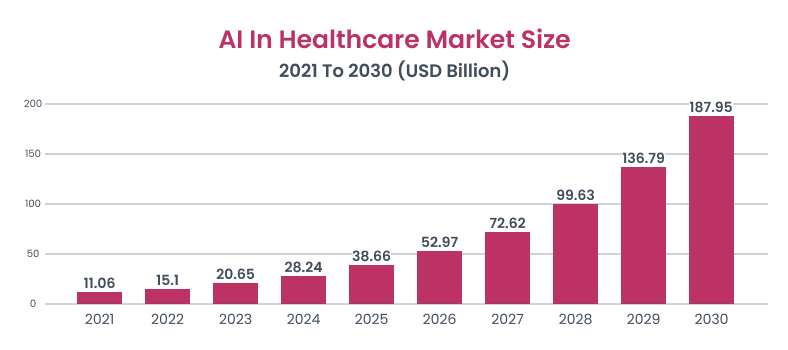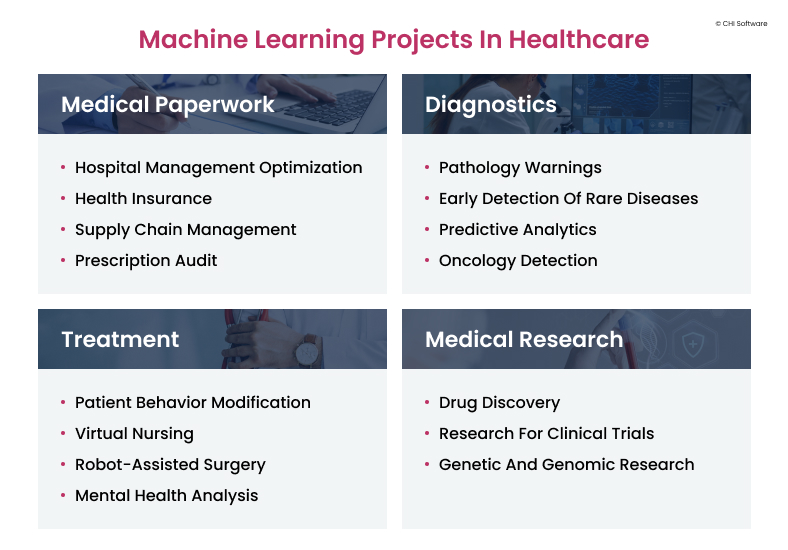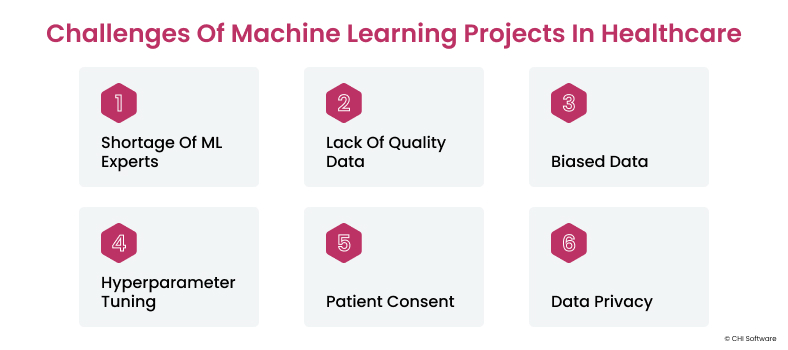Healthcare is one of the most important industries in the world, bearing a tremendous responsibility over people’s well-being. Decreasing the margin of error and making treatments more precise can save lives – but to do that, the industry needs to evolve.
Artificial intelligence (AI) is the next step for healthcare. Many organizations already use it to some extent, and this trend doesn’t look like it will end any time soon. Recently, one particular type of AI has gained significant traction – machine learning (ML). Let’s talk about it.
Machine Learning in Healthcare: How It Works
Machine learning (ML) is a type of AI that imitates the human learning process. There are four different types of ML models, based on how they are trained. However, the general flow is the same for every type:
- Problem: The user states a problem and the expected result;
- Decision: The ML model tries to guess at data patterns the user may be looking for;
- Error encounter: The model measures its success by comparing the results to known examples;
- Update or optimization: The model updates its decision-making based on the results and tries again.
Each iteration gives the ML model new knowledge and makes the next one perform better. Since pattern discovery is the main purpose of machine learning models, they are especially useful in healthcare.
Predictive Analytics in Healthcare: Improving the Future with AI
Read more
The healthcare industry contains large amounts of valuable data. Patient records, medical articles and research, medical imaging – the amount of information is so substantial that it’s virtually impossible for humans to analyze and account for everything. Yet even though the task is daunting and the margin of error is significant, the data is still valuable.
What may seem an impossible challenge for humans — ML projects in healthcare can do in seconds. By utilizing deep learning algorithms, the technology can analyze the patient’s records and medical images to discover patterns and signs that could potentially lead to disease identification and optimal treatment.
AI Market Data: How Valuable Is It in Healthcare?
According to statistics from Precedence Research, the market size of AI in healthcare was 15.1 billion USD in 2022, with a rise to 187.95 billion USD in 2030.

There are a couple of drivers to consider behind this growth. Firstly, the healthcare industry is genuinely interested in aid tools for healthcare professionals powered by deep learning models. This interest resulted in the healthcare sector financially supporting AI development from its earliest iterations.
Secondly, today’s market is focused on cost-effectiveness, while maintaining the quality of services. This is easier said than done, considering the surge in threats to public health in recent years.
The combination of these factors has led to eager adoption of AI-powered tools in healthcare for medical diagnostics and automation purposes.
But are machine learning algorithms really applicable to healthcare? Let’s look at the use cases.
15 Machine Learning Projects in the Healthcare Sector
In healthcare, machine learning models rely on either research or patient data, depending on AI’s purpose. The latest ideas for AI/ML-based projects in healthcare can help sort and categorize data to discover patterns in datasets, which can lead to new insights. Because of this, ML models are applicable to practically any major task in the healthcare industry.
We’ve divided machine learning projects for healthcare into four groups: research, diagnostics, treatment and medical paperwork. Here is how it’s used in each group.

Machine Learning in Medical Paperwork
When people speak about the healthcare sector, they tend to focus on medical diagnostics and treatment. However, administrative processes are another important aspect of the healthcare workflow. In fact, intermediate projects based on ML in the healthcare field are already helping with health insurance, supply chain management, and patient data management. Let’s look at how machine learning algorithms can help out with paperwork.
Hospital Management Optimization
Growing demand for healthcare services often leads to more paperwork. Luckily, machine learning models can help.
Most tedious processes that take up a lot of employees’ time can be automated. For example, inventory management can be left to AI, since it can analyze inventory stock and automatically request missing items.
Another benefit of AI comes in staff scheduling. Instead of doing it by hand, AI can automatically go through each employee’s working hours and create an optimized work schedule.
Health Insurance
Most companies are still using manual processes to create insurance plans for people based on their medical history; however, with machine learning projects related to healthcare, it’s a thing of the past.
Instead of manually reviewing patient records, you can leave this task for the AI, which can automatically go through a patient’s records and develop an insurance plan covering the most probable causes of health risks. As a result, work that previously could take days will be done in minutes.
As a neat bonus, machine learning’s pattern recognition can assist in fraud detection, and even detect false positives. Health insurance automation saves time and money from potentially fraudulent activities.
AI-Powered Training App Development: The Ultimate Guide
Read more
Supply Chain Management
One of the most persistent problems in the healthcare sector is supply chain disruptions. While not something new, past methods of addressing them usually fell short, creating shortages. Today, that has all changed, thanks to AI.
Some projects in healthcare using ML and DL can automate many tasks regarding paperwork that previously had a high margin of human error – consider the case of contacting suppliers and planning.
Instead of relying on humans to contact suppliers and search for the best deal, you can leave this task for AI to do automatically. Higher operational efficiency leads to higher profits and less chance of going out of stock in critical moments.
Big Data, Big Impact: How Analytics Are Transforming Healthcare
Read more
Prescription Audit
Prescription errors happen mostly as the result of human error, or rare cases of two patients with identical names and diagnoses. While this might seem insignificant, it can lead to serious patient outcomes and, in some cases, losing money on insurance.
To address this issue, some healthcare and wellness providers have adopted machine learning. Firstly, it eliminates human error, since ML algorithms are more vigilant and attentive than humans.
Secondly, by analyzing patient records, AI can find the perfect prescription for every patient that will have minimal side effects. This is important because some prescription drugs can worsen conditions if the patient is allergic to any of the drug’s ingredients.
Machine Learning Projects in Diagnostics
The faster a diagnosis is made, the better the odds for positive patient outcomes. Machine learning models can help out with this task by spotting early warning signs of diseases. Here are a couple of examples of how it works.

Pathology Warnings
Recently, researchers have been combining machine learning capabilities with medical imaging to make the diagnosis process more accurate.
They utilize fine-tuned ML models trained on medical images based on bodily fluids’ appearance. By combining machine learning with computer vision, software can detect deviations in real time.
At this point, such systems are still in the early development iterations. Therefore, they rely on human medical expertise to verify and validate the machine-made analysis.
Early Detection of Rare Diseases
Since human medical professionals can’t possibly hold the symptoms of every known illness in their head, they require outside help for disease diagnostics.
Machine learning projects in healthcare focus on improving diagnostic accuracy by training models on descriptions of every known disease and its symptoms. But what about diseases that have similar symptoms?
To avoid false positives, ML models collaborate closely with human clinicians. However, given the rapid advancements in machine learning, it’s likely that AI will eventually operate independently.
Predictive Analytics
The best way to save the lives of high-risk patients is to prevent complications from developing. Disease detection through medical images at early stages is possible, but their reliability still involves guessing. Machine learning tips the scales in our favor.
ML algorithms can analyze patient records and medical imaging to detect risk factors and predict the likelihood of conditions or diseases. This approach works best with computer vision for even broader patient analysis.
The analysis results in the prediction of complications, and ways to mitigate them. This way, ML models can enhance patient outcomes and save money and time for a potentially complicated treatment.
Oncology Detection
When it comes to cancer research and treatment, speed is everything. Early detection of cancer cells guarantees better patient outcomes. In recent years, researchers around the world have started working on machine learning projects for oncology detection.
At CHI Software, we contributed to this progress by upgrading a client’s legacy oncology software, migrating it to cloud and microservices architecture. The update improved scalability by 25% and created a solid foundation for future AI integrations in cancer diagnostics.
With the help of AI, medical experts can detect cancer in patients at very early stages, effectively increasing their chances of surviving. While this implementation is relatively new, it has already shown promising results by saving the lives of numerous cancer patients.
Machine Learning in Treatment
In this category, machine learning projects take the role of clinical decision support. They provide doctors and patients with information about the best course of action for the patient’s health. It is common to see solutions that combine machine learning techniques with deep learning or natural language processing (NLP). Here are some examples.

Patient Behavior Modification
One of the best ways to keep patients healthy is to prevent them from developing bad habits. However, such habits tend to be hard for patients to break on their own. This is where machine learning comes in.
ML models can analyze patient data gathered in real time through wearable tech and generate insights or helpful tips. This creates support for patients who try to quit smoking, for example.
Virtual Nursing
Some medical centers experience problems with the ratio of nurses to patients. This is another task that machine learning can help with.
By utilizing ML models, businesses can create remote patient monitoring systems with virtual nurses who tend to their patients through their phones. They can schedule appointments with doctors, answer questions, and show empathy while communicating with patients.
Telehealth App Development: Everything You Need to Know
Read more
Robot-Assisted Surgery
Since healthcare always strives for perfection, the introduction of machine learning has the power to mitigate even the narrowest margin of error in hospitals.
Robots powered by machine learning can be valuable assistants for medical professionals. With their deep learning algorithms, such robots can help surgeons perform complex procedures more precisely, especially when it comes to microsurgeries. A great example is neurosurgery, where one wrong move can determine the operation’s success.
Mental Health Analysis
The growing attention to mental health highlights the need for an effective healthcare system that can identify early signs of mental health problems, and recommend effective treatment.
In this pursuit, machine learning has emerged as a valuable tool. The ML model conducts psychological tests and analyzes medical records to detect early signs of anxiety, depression, or, in more severe cases – schizophrenia.
Machine Learning in Medical Research
Machine learning models excel at pattern discovery – and if they are trained on previous research papers and articles, they can provide scientists with helpful insights. Here are examples of machine learning projects for pharmaceutical companies.

Drug Discovery
The drug discovery process requires both a lot of creativity and precise knowledge of how chemicals interact. These are exactly the characteristics of machine learning projects for biomedical engineering.
ML model’s deep learning capabilities make it a perfect discovery tool. How? By knowing existing drugs and their effects, machine learning algorithms can create new chemical combinations based on the side effects of already-known medicine. Another benefit of using AI is its ability to conceive new drugs during compound or substance testing.
ML models make drug discovery as straightforward as it can be! Healthcare professionals feel the results – the drugs created in this way tend to be cheaper and improve patient outcomes.
Clinical Trials Research
Machine learning can speed up clinical trials in various ways. For example, the model’s deep learning algorithms can optimize protocols to mitigate redundancies. To do that, the model needs a dataset containing historical clinical trial data, and knowledge of tested medicine.
Faster clinical trials means getting new medicines to patients faster, cheaper, and with potentially better patient outcomes.
Genetic and Genomic Research
The medical practice of genetic and genomic research contains a lot of complex data. While it might be hard for humans to comprehend, it’s no problem for machine learning.
With AI’s ability to analyze large amounts of data and the ML model’s pattern recognition, healthcare has become a perfect insight-generating machine. It enables researchers to collect data on a cellular level and identify cell types.
The implications are huge – from more effective cancer treatment to personalized medicine. By understanding the information in a patient’s cells, healthcare professionals can identify potential disease risks and take appropriate actions to mitigate them.
To summarize, machine learning is taking the healthcare industry by storm. Automated paperwork, improved patient outcomes, research, and drug discovery assistance – the applications are limitless! However, just as every rose has thorns, every technology has its obstacles. Let’s talk about them.
Challenges of Machine Learning Projects in Healthcare
Despite ML models being seemingly a godsend for healthcare providers, there are some risk factors you should know about.

Shortage of ML Experts
To create and operate a machine learning model, you need a team of qualified machine learning and data science experts. This is easier said than done due to the overall shortage of such experts on the market.
This problem isn’t getting easier, since such experts are always in demand, so competition is high. On the bright side, this problem has two solutions.
First, you can hire entry-level data scientists and machine learning engineers and train them. This may take a lot of time and resources – but the end result will be a team qualified to meet your needs.
The second option is to outsource development. Creating your own team from scratch takes time, so why not hire people who already have the proper expertise in data science? Luckily, you have found us!
We at CHI Software have experience creating ML models for various industries, so if you want to make your goals come true – contact our artificial intelligence development company today!
Lack of Quality Data
To operate properly, your ML solution needs perfectly labeled and structured health data. Additionally, if you want your model to perform medical image analysis, you need to provide high-quality medical images of how symptoms look.
Healthcare providers have a lot of medical records and other data to work with. But not all of it fits easily into ML model training, since AI training requires datasets with clean data and structure.
There are two ways to deal with the lack of quality data: either find free datasets, or collect data from patients directly, through surveys.
Cybersecurity in Healthcare: Protecting Patient Data
Read more
Biased Data
One of the biggest concerns of healthcare providers is biased models, which often stem from the use of biased data.
For example, if the model is trained more on males’ medical history, it might give false medical diagnostics for female patients. For this reason, you need to diversify your data. Try to include as many nuanced cases and saturated information as possible for better clinical decision support.
Hyperparameter Tuning
The complexity of ML models is their strong side and downside at the same time. Machine learning uses hyperparameters to determine the outcomes. The problem comes when you want to change them for model optimization.
While there’s no easy shortcut to make this process faster or easier, you can prevent this problem by having clear goals and communicating them to your development team. The better the understanding between employers and employees, the better the odds to achieve your goals from the start. Also, you can look into already existing models for adoption.
Patient Consent
As we already know, ML models rely on datasets as their knowledge bank. These datasets often contain patients’ electronic health records – which come with challenges for model training.
Firstly, since patient data is considered sensitive, you need the patient’s consent to use it. In some cases, it’s easier said than done since not every patient will agree with the idea of their data being used for AI training.
Secondly, there are laws and regulations around patient data and how it should be handled. Research your local laws on this topic since it might determine what you can or cannot legally do.
To deal with this challenge, make sure you notify patients that their data might be used for AI training and make them sign consent forms. Additionally, patient data should be anonymized to protect their privacy.
Data Privacy
Patient data is very valuable, which is why it’s often targeted by malicious actors. This creates security threats for the healthcare industry. Since ML models are trained using patient data, they are under threat as well.
After obtaining the necessary data, you first need to ensure it’s protected before doing anything with it. Create a separate protected environment for model training with access controls and encryption systems. Add network protection, and firewalls to ensure it’s safe for model training.
Future Applications of AI-Enabled Technology in Healthcare

Nowadays, we see only the first steps of machine learning adoption by the healthcare industry. There are a lot of uses already being put into practice, but what can we expect to see in the future?
Wider Adoption of Personalized Medicine
Nowadays, this application of ML is starting to gain traction among providers, but it is still far from becoming a global healthcare standard. Most treatment plans today are the same for everyone. While the traditional method works, some treatment plans won’t be effective in nuanced cases – and that can make all the difference.
The main logic behind an AI-based approach is to analyze every patient’s DNA individually. Based on this data, doctors can see predispositions for some illnesses and prescribe more effective medication. The problem with this method is that the DNA contains large amounts of data to analyze. This is where ML models can help.
Machine learning can find patterns in DNA sequences and compare them to database knowledge in order to come up with a diagnosis and personalized treatment plans.
Blockchain Integration
Blockchain is a decentralized technology that can be used for streamlined data sharing. Combining blockchain’s security with machine learning’s analytical powers, we can expect to have a transparent and efficient supply chain.
Additionally, this fusion can tokenize healthcare assets, such as genome information or donor organs. Think of blockchain as a space to share and trade assets that’s protected by ML to prevent fraudulent activities.
mHealth App Development: The Complete Guide
Read more
Real-Time Supply Chain Optimization
Efficient supply chains are a key to success in any business. Still, such optimization is hard to implement due to many factors being in flux – but this can be addressed using machine learning.
By leveraging ML models, healthcare organizations could potentially optimize routes based on real-time conditions, such as demand, traffic, weather and other external factors. Needless to say, supply chain micromanagement using AI has the potential to bring cost savings and efficiency to the table.
AI-Powered Cybersecurity
With an ever-growing amount of sensitive clinical data in the industry, we can expect AI to become a must-have cybersecurity tool. With the ability to analyze the state of business security and notice cyber threats at early stages, machine learning might just be perfect for this task.
Advanced Predictive Analytics
While predictive analytics are already present in healthcare, this technology has a ways to go. We could soon see major improvements in accuracy due to real-time patient monitoring and including environmental factors in the analysis. The goal is to perfect the disease identification system and create better patient outcomes.
Final Thoughts
Machine learning brings a lot of value to healthcare institutions. ML models are versatile and can help patients and doctors with a wide variety of tasks, from clinical trials to inventory management.
Another strong side of machine learning comes from how it complements other AI technologies. A great example is computer vision fusion with ML, which gives healthcare professionals an assistance tool for medical image analysis and disease detection at early stages.
Creating machine learning models for your business is a beneficial but difficult process. For better results, you need a team of experts in the AI field. Luckily, we at CHI Software provide you with healthcare AI consulting, so contact us, and we will gladly help you!
FAQs
-
What are machine learning projects in healthcare?

Machine learning projects in healthcare are flexible enough to be useful in all stages of healthcare, from diagnostics and treatment to hospital management. Some of the projects include:
- Predictive analytics where doctors can detect signs of diseases in the early stages;
- Diagnostics and treatment, thanks to its ability to detect illnesses and suggest treatment;
- Mental health analysis can inform patients of mental health issues and contact medical experts for treatment;
- Hospital management can be automated by ML models thanks to its analysis capabilities;
- Drug discovery becomes easier since ML can analyze medical research to help discover new drugs.
-
How do machine learning algorithms benefit healthcare?

ML models can provide healthcare organizations with better efficiency and accuracy of procedures. Some of the benefits are:
- Improved diagnostics: machine learning can analyze patients’ electronic health records and recognize symptoms;
- Predictive analytics: ML models are exceptionally good at health risk predictions;
- Remote monitoring: ML models can monitor a patient’s condition via wearable tech in real time;
- Operational efficiency: tedious tasks can be automated with the power of machine learning models;
- Research support: by analyzing existing data, ML models can help in drug discovery or deciphering genomic data.
-
What types of healthcare data can be analyzed with machine learning?

There are three types of data usable by ML models:
- Patient data, such as electronic health records;
- Medical imaging like tomography or X-rays;
- Medical articles and historical data on previous encounters with diseases or viruses.
-
How long does it typically take to complete a healthcare machine learning project?

Depending on the type of ML model you intend to use and its functions, the process might take between six months to over a year. For more precise information, contact us, and we will give you estimates for your case.
-
How do you ensure the accuracy and reliability of machine learning models in healthcare?

The accuracy and reliability of machine learning in healthcare relies on two factors: quality of training data and model fine-tuning.
Quality data refers to datasets that are properly labeled and structured in order to ensure the ML model has reliable information. Fine-tuning the model makes sure that your model will behave precisely the way the user wants.
About the author
Alex is a Data Scientist & ML Engineer with an NLP specialization. He is passionate about AI-related technologies, fond of science, and participated in many international scientific conferences.
Rate this article
22 ratings, average: 4.5 out of 5









